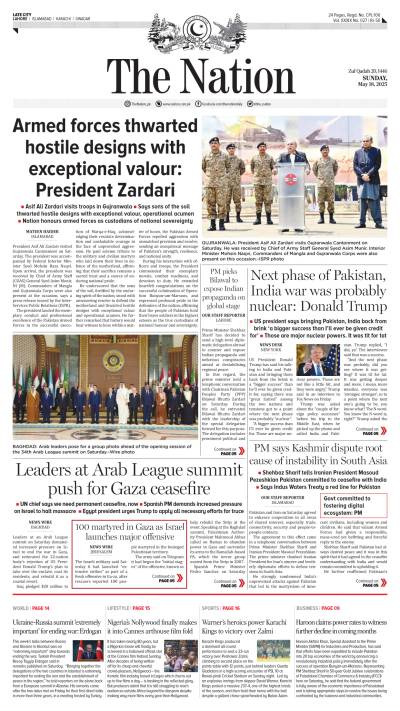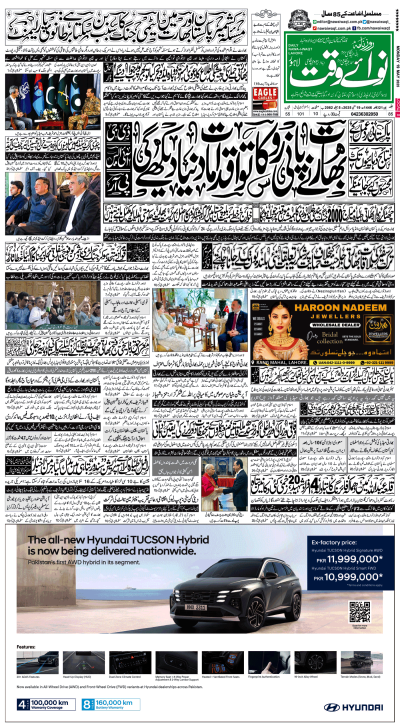ISLAMABAD - Prime Minister Imran Khan on Tuesday linked the sensitive issue of Pakistan’s recognising the state of Israel to the resolution of Palestine issue in line with the aspirations of the Palestinian people.
The premier ruled out the possibility of recognising Israel and said his government has been successful in setting direction of the country as Islamic Welfare State and expressed the hope to elevate the plight of poor by brining end to the deeply entrenched ‘elite capture culture’ in the country.
“We cannot recognise Israel as founding father of Pakistani nation Quaid-i-Azam Muhammad Ali Jinnah had made it clear in 1948 that Pakistan cannot recognise Israel until and unless issue of Palestine state was resolved,” Imran Khan stated this in an interview to a private TV channel on the eve of completing two years of his government.
The Prime Minister further said that Pakistan cannot recognise Israel as long as Palestine issue was resolved because such an effort could also harm the status of Kashmir dispute. Responding to a question about any differences with the Kingdom of Saudi Arabia, Imran Khan while ruling out any differences with Riyadh said, “There are no differences as both the countries are in full contact. Every country has its own foreign policy.” “Pakistan’s main role is to unite the Muslim Ummah, which is not an easy task”, Prime Minister asserted. He went on to say that Pakistan has gained marked significance because of its foreign policy over the past two years. “Today, India is in more isolation and standing in disadvantage position because of its Hindutwa policy”, he added.
About importance of China Pakistan Economic Corridor (CPEC), PM Imran Khan made it clear that Pakistan’s future is linked to China. He said Pakistan is further deepening its cooperation with China and Chinese President is expected to visit Pakistan soon.
Prime Minister Imran Khan said that the last two years of his life were the toughest, despite having struggled all his life, as the country was facing challenges from all fronts. “My entire life has been a struggle,” he said, talking about his decision to become a cricketer early on and to later set up the Shaukat Khanum Memorial Cancer Hospital. “Politics was the biggest struggle.” “But when you keep at it continuously, you learn how to do it, he said. “You no longer fear of ups and downs. What happens is that when people don’t struggle for something, they become worried when there are ups and downs.”
So many people made political parties, but I think they gave up during bad times, he said. “Because I had an idea, I was constantly learning and getting back up on my feet.”
These two years were the biggest struggle yet because there were several challenges, the premier said. “The country’s economy had crashed, we were defaulting on payments, we didn’t have money to pay our debts, institutions had collapsed and government corporations were in debt. There was no one place to concentrate on, he said, adding that this was a learning experience.
So in the first two years, we understood the challenges the country was facing and then I tried to change its path towards what it was originally made for, a welfare state, he said. “Today if you ask me what I have tried to do, I will say I have tried to put the country on the path to becoming a welfare state. If we want to progress, we have to go back to that model.”
He stated that Pakistan had an “elite capture”, where a small minority had access to facilities and were taking advantage of the system. “They think they have a privileged position and are above the law. If you think about it, in the past two years, steps were taken for the very first time to bring them under the law.”
Commenting on the country’s success in controlling the coronavirus pandemic, the premier stated that he had always thought about the poor and the vulnerable segment of society when told to impose a lockdown to curb the spread of the illness. “Bill Gates said to me that we want to study [Pakistan’s trajectory,” he added. When asked about the sorry state of affairs in Karachi, the premier said that the people of the city have suffered and so has the country as a consequence.
“It is Pakistan’s economic engine,” he said, adding that the lack of a local government system has contributed majorly to the metropolis’ issues. “Big cities have their own set up and they take their own responsibility” There needs to be a local government system in Sindh,” he said. He added that the Centre was doing all that was possible and the people of the city would see improvement in the near future.






